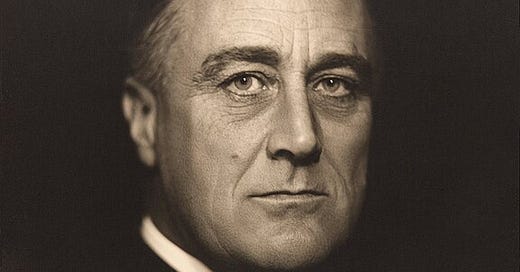March 4, 1933
FDR’s First Inaugural Address
Today is the final installment of our exploration of this magnificent speech, FDR’s vision for his Presidency.
Tomorrow, we see how he gets his vision in front of the people — with his first Fireside Chat.
All emphasis mine.
We face the arduous days that lie before us in the warm courage of national unity; with the clear consciousness of seeking old and precious moral values; with the clean satisfaction that comes from the stern performance of duty by old and young alike.
We aim at the assurance of a rounded and permanent national life.
We do not distrust the future of essential democracy. The people of the United States have not failed. In their need they have registered a mandate that they want direct, vigorous action.
I refuse to sink into pessimism in these dark times.
I do not distrust the future of democracy. The people of the United States have not failed. Our political institutions have failed them.
We have one party — the GOP — who has played fast and loose with “the rules” we play by for at least 30 years — operating in bad faith with both the opposition party and the American people, and standing up a propaganda arm in our media.
Meanwhile, the Democrats — while operating in good faith and with principle — have lived in fear of the GOP for far too long. Their failure is in being unwilling to stand up to the bully and realize that the rules have changed. And that to create the change we want, we must have political power, not political purity.
Both of these institutions — along with our Courts, Congress, and media — have capitulated to the Trump cult of personality that divides our country and urges us to hate one another — all to distract from their pro-billionaire agenda.
The people have told us they want change — fundamental change to their lives of endless work for little pay, health insurance companies that deny needed medical treatment, and skyrocketing costs for essential things like insurance, housing, and education.
It is up to the Democratic party to return to the workers first message of FDR.
It is time for the Democratic party to remember that “politics” is just as important as “policy” if we want to make real change that will help the working class.
Here’s the video:
Some historic context from Wikipedia: — on March 4, 1933 — Inauguration Day —the U.S. was at the nadir of the worst depression in its history. A quarter of the workforce was unemployed, and farmers were in deep trouble as prices had fallen by 60%. Industrial production had fallen by more than half since 1929. Two million people were homeless. By the evening of March 4, 32 of the 48 states—as well as the District of Columbia—had closed their banks.
Energized by his own victory over paralytic illness, FDR used persistent optimism and activism to renew the national spirit and make lasting policy changes to benefit the working class.
And when did Inauguration Day change from March to January? From the White House Historical Association:
The Twentieth Amendment, also known as the “lame duck” amendment, was proposed and authored by progressive Nebraska Senator George Norris in 1922. While communications and travel during the late eighteenth and nineteenth centuries were more difficult, necessitating a nearly four-month gap between winning election and taking the Oath of Office, by the twentieth century much had improved in terms of travel and technology, allowing for an earlier Inauguration date. Norris also sought to tackle a larger problem. Previously, a president that lost reelection could govern during the lengthy lame duck session without having to be responsible to voters. Shortening this lame duck period was meant to strengthen democracy and avoid a future Constitutional crisis.
After introducing this legislation five times, Norris was finally successful on his sixth try in March 1932. The Amendment passed Congress and was ratified by the States in January 1933.
Today, presidents serve a four-year term, beginning on January 20 at noon, and ending four years from that date and time exactly.
Tomorrow — we move on to FDR’s first Fireside Chat, his famed radio addresses where he meets the American people where they are. Where they get to know him.
In it he explains the banking system to ordinary people in language they can understand— and then tells them how his policies will make banks work better for them.
Be sure to subscribe so you don’t miss your Daily Delano — quotes to inspire you from our 32nd President.
As a public service, The Daily Delano will always remain free to all subscribers — but if you want to support a working gal with a paid subscription, I’m much obliged.



